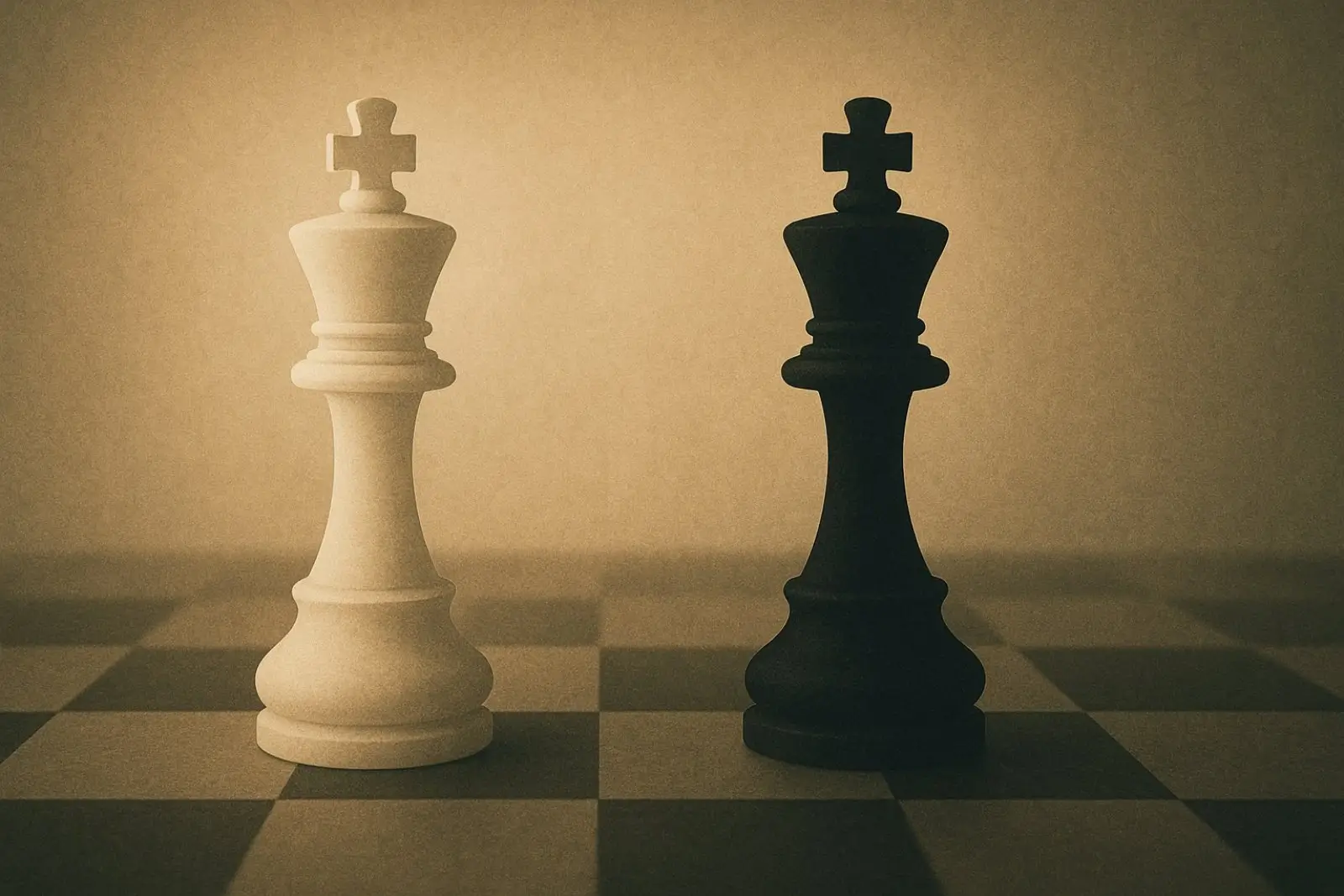Introduction
When players try to improve at chess, they often focus on openings and tactics. But strong players know a quiet truth: endgames win games.
Endgames are where understanding beats memorization. They teach you how to convert an advantage, hold tough positions, and outplay opponents when every move matters. Yet most players neglect them – losing won positions or failing to hold drawn ones.
This blog gives you a clear, step-by-step roadmap for studying endgames the right way. Whether you’re a beginner or looking to level up, mastering endgames will transform your results.

“To improve at chess you should in the first instance study the endgame.” – Jose Raul Capablanca
1. Build a Solid Foundation
Before diving into advanced techniques, you must first master the fundamentals – the essential tools every chess player needs in their endgame toolkit.
Start with Essential Checkmates
Knowing how to deliver basic checkmates confidently is your first checkpoint. This includes:
- King and Queen vs. King
- King and Rook vs. King
- King and Two Bishops vs. King
- King, Bishop and Knight vs. King (more advanced, but a great long-term goal)
These endgames train your ability to coordinate pieces, use the king actively, and understand how to control space with precision.
Learn Basic Endgame Theory
Once you’ve learned the basic checkmates, the next step is to study the core ideas that make up basic endgame theory. These include concepts that appear again and again in practical positions and form the foundation of endgame play. Some of the most common principles include:
- Pawn Endgames
- Rule of the square
- Opposition
- Shouldering
- Triangulation
- Bahr’s rule
- The outside passed pawn
- Rook Endgames
- Lucena position
- Philidor position
- Vancura position
- The short-side defense
If you’d like to dive deeper, you can learn all the essentials about pawn endgames in my Winning with Pawn Endgames course or reach out for personalized endgame training tailored to your level.
Why These Basics Are Non-Negotiable
Skipping the fundamentals is like trying to run before you can walk. No matter how many complex positions you study, if you can’t convert K+Q vs. K or understand opposition, you’ll struggle. These basic skills are not just for beginners – they form the core of even the most advanced endgame techniques. Think of them as your safety net: reliable, repeatable tools that help you win (or save) countless games.
2. Learn Endgame Strategy/Principles
Understanding general endgame strategies and principles is the second key step to improving your endgame skills. These ideas not only guide your overall strategy but also help you create a clear plan of action. Some of these principles include:
- King Activity
In the endgame, the king becomes a strong piece. Centralizing it allows you to support your pawns, attack weaknesses, and fight for key territory. - Piece Activity
Active pieces dominate passive ones. A rook cutting off the enemy king or a knight occupying a strong square can decide the outcome of the game. - Passed Pawns
A passed pawn – one with no opposing pawns blocking its path – can be a game-winner. Support and advance it carefully, especially in simplified positions. - Weak Pawns
Isolated, backward, or doubled pawns can be targeted and captured in the endgame. - Weak Squares
These are squares that cannot be defended by pawns. You can use them as outposts for your pieces or invasion paths for your king.
Mastering these endgame principles gives you a strategic edge and helps convert small advantages into full points in your games.
3. Practice Regularly
Studying endgame theory and strategies is essential – but it won’t stick unless you practice consistently. Endgame skill comes from repetition, trial and error, and reflection.
Add Endgame Drills to Your Weekly Routine
Set aside time every week to solve specific endgame drills. Tools like Chess.com’s Endgame Trainer or Lichess’s Endgame Practice are perfect for structured, hands-on learning.
Play Simplified Positions
Create or play out simplified endgames against a computer or a training partner. This helps you focus on the essentials without the distractions of a complex middlegame.
Tip: Start from a known theoretical position and play both sides. This deepens your understanding of both the winning and defending side.
Analyze Your Own Games
Every time you play a serious game, pay close attention to how the endgame unfolded:
- Did you activate your king early enough?
- Did you recognize a critical position like Philidor or Lucena?
- Could you have simplified it to a better endgame earlier?
This kind of self-reflection turns every game into a lesson and ensures you’re not repeating the same mistakes.
4. Use High-Quality Learning Resources
To study chess endgames effectively, choosing the right learning materials is crucial. The combination of classic books and modern online tools creates a powerful, well-rounded approach.
Books: Timeless Foundations
Well-structured books offer clear explanations, logical progressions, and carefully selected examples. Some classics you might consider include:
- Silman’s Complete Endgame Course by Jeremy Silman
- Capablanca’s Best Endings by Irving Chernev
- Endgame Strategy by Mikhail Shereshevsky
- 100 Endgames You Must Know by Jesus de la Villa
Online Tools: Interactive and Engaging
- Chess.com Endgame Drills: Offers puzzles and practice drills to reinforce concepts.
- Lichess Endgame Trainer: Completely free, it lets you practice against strong engines in various endgame scenarios, sharpening your technique under realistic conditions.
Combining Books and Tools Effectively
Use books to build your theoretical knowledge and understand the “why” behind moves. Then, use online trainers to practice actively, testing yourself in real-time scenarios. This combination cements your knowledge and improves recall during games.

5. Learn with Others
Studying chess endgames doesn’t have to be a solo journey. Collaboration can deepen your understanding and keep you motivated.
Join Online Forums
Places like the Chess.com forums or Lichess community provide spaces to ask questions, share resources, and discuss tricky endgame concepts. Seeing different perspectives often reveals nuances you might have missed.
Participate in Study Groups or Chess Clubs
Local or online chess clubs and study groups allow for regular, structured sessions. You can:
- Analyze endgames together
- Challenge each other with practical exercises
Why Collaboration Matters
Explaining ideas to others helps you clarify your own thinking. Feedback from peers highlights gaps in your understanding and introduces fresh ideas. This social aspect makes endgame study richer, more engaging, and more effective.
Conclusion
Studying endgames may not feel as flashy as learning sharp openings or solving tactics, but it’s one of the most powerful ways to improve your chess. Endgames are where precision, understanding, and technique shine – and where games are truly won or saved.
By building a strong foundation, mastering essential concepts, practicing consistently, using quality resources, and learning with others, you set yourself up for lasting improvement. The skills you gain will not only help you convert advantages and defend worse positions but also deepen your overall strategic understanding of the game.
So start small, stay consistent, and enjoy the journey – because the better you get at endgames, the more confident and complete a chess player you’ll become.
And if you’re ready to take the next step, check out my Winning with Pawn Endgames course or contact me for personalized guidance.
Frequently Asked Questions
1. How much time should I spend on endgames compared to openings and tactics?
A balanced approach is ideal, but most beginners and club level players spend too much time on openings. Devoting 20–30% of your study time to endgames can lead to noticeable improvement in your results, especially in longer time controls.
2. Do I need to memorize endgames, or just understand the concepts?
Understanding is more important than memorization. Focus on grasping key principles and patterns – like opposition or Lucena – and then reinforce them through practice. With time, memorization will come naturally from repetition.
3. What are the most important endgames to learn first?
Start with basic checkmates then move on to pawn and rook endgames. These appear most frequently and have the highest practical value.
4. Are online tools enough, or should I use books too?
The best results come from combining both. Books give depth and structured explanations, while online tools provide interactive practice that sharpens your skills in real time.
5. I’m losing endgames even when I’m ahead – what should I do?
This usually means you need to improve both your technique and understanding. Review your games to identify specific mistakes, study similar positions, and practice converting advantages using endgame drills.
